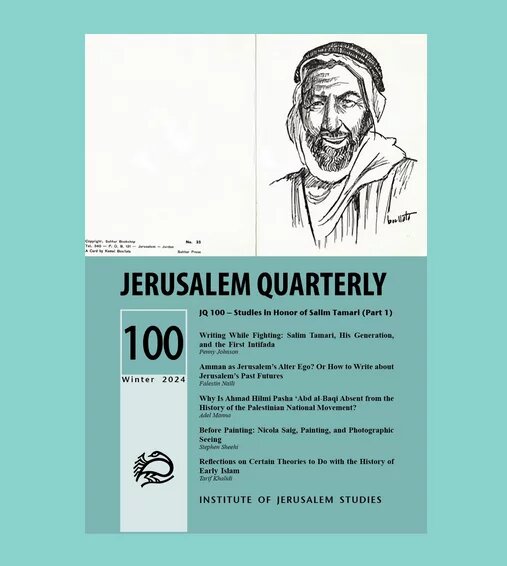
Hbs gladly announces the release of the new issue of Jerusalem Quarterly (JQ 100) by our long-standing partner, Institute for Palestine Studies. This special issue, titled “Studies in Honor of Salim Tamari” along with the next, honors the remarkable contributions of sociologist and historian Salim Tamari—JQ’s founder—to the social history of Palestine. On these pages, a diverse group of his colleagues and former students offer reflections and insights on the themes Tamari has explored throughout his illustrious career, paying tribute to his enduring legacy in the field.
The Institute for Palestine Studies is the oldest institute in the world researching and publicizing on Palestinian affairs and the Arab-Israeli conflict. Established in 1963 in Beirut as an independent, non-profit Arab institute, it is regarded as the major source of accurate information on Palestinian affairs throughout the Arab world. It provides comprehensive material of current regional affairs with an emphasis on peaceful conflict resolution.
Jerusalem Quarterly is the only journal that focuses exclusively on the city of Jerusalem; its history, political status, and future. It addresses debates about the city and its predicament as well as future scenarios for solving the problems of Jerusalem. Sponsored by the hbs, the essays in this special issue of Jerusalem Quarterly honors Salim Tamari and his legacy in and beyond JQ. In his introduction, guest editor Issam Nassar, Tamari’s long-time colleague and fellow JQ collaborator, reflects on Tamari’s scholarship, which inspired many of the articles and essays curated here. While this issue celebrates Tamari’s impact on the field of Palestinian studies, his influence can be seen more broadly in the numerous contributions to the pages of the JQ.
This special issue of the Jerusalem Quarterly, and the next, celebrate the distinguished work that renowned sociologist Salim Tamari – JQ’s founder – has made toward the social history of Palestine. Here, a number of his colleagues and former students contribute writings that reflect on themes Tamari explored throughout his distinguished career. Tamari’s work spans decades, providing groundbreaking insights into Palestinian history and society. Tamari’s pioneering work in social history, his use of diverse sources like photography, and his interdisciplinary approach have enriched Palestinian studies, offering new avenues for understanding the complexities of Palestinian life. His legacy as a scholar, mentor, and institution-builder continues to inspire and shape the field.
In this issue, Penny Johnson, a longtime friend of Salim, provides an overall review of his writings and political contributions, while Falestin Naïli describes how stories and voices of the past guide our perceptions of the present, as she examines similarities between Amman and Jerusalem. Tarif Khalidi’s essay, on the other hand, explores critiques of early Arabic Islamic historical sources, focusing on their perceived teleological nature (“salvation history”), the time gap between events and their documentation, and the lack of contemporary historians. In Adel Manna’s essay, the life of the prominent yet overlooked Palestinian leader of the early twentieth century, Ahmad Hilmi Pasha ‘Abd al-Baqi, is explored. Manna highlights the diverse career of ‘Abd al-Baqi that spanned political, economic, cultural, and military roles, including defending Jerusalem during the Nakba in 1948. Stephen Sheehi’s contribution critically highlights the work of Nicola Saig (1863–1942), a prominent iconographer and painter in Jerusalem, who played a central role in shaping the city’s distinct Qudsi style of Orthodox iconography. Saig bridged religious and secular art, blending iconographic techniques with European secular painting to create a hybrid style that reflected his generation’s multifocal identity.
The various contributions mentioned above align with Salim Tamari’s emphasis on micro social history, memory, biography, and visual culture – each a central theme. Together, they serve as both a tribute to his work and meaningful contributions to the study of Palestine.
The next JQ issue will present additional contributions honoring Tamari’s work, including essays by: Anton Shammas on Israel’s appropriation of Palestinian cuisine; Talha Çiçek on state and society in late Ottoman Gaza; Alex Winder on the legacy of Abu Jilda, the rebel bandit from British Mandate Palestine; and Issam Nassar on the war memoirs of Anwar Nussiebeh.
You can download the JQ- 100 issue below.